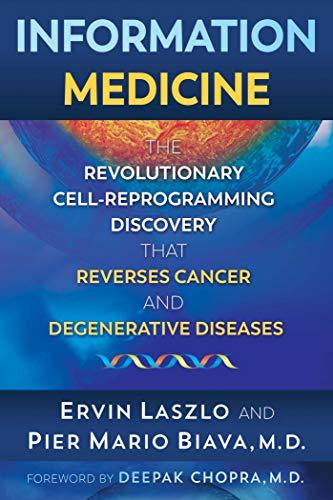
A look at the future of medicine based on cutting-edge stem cell research • Shares Dr. Biava’s groundbreaking research on stem cell differentiation stage factors (SCDSFs) as a cellular “reprogramming” treatment for cancer and other degenerative diseases • Explains how SCDSFs restore communication between cells and the epigenetic code, the information that programs the normal function and growth of every living cell • Explores how the universe operates like a cosmic information-network and how this new scientific worldview will shape the future of healing and medicine The universe is not a mechanical system of matter—it operates like a cosmic network that runs on and is connected by information. Information “in-forms” and underlies all of the physical world, including the human body. In this book, Pier Mario Biava, M.D., and Ervin Laszlo, Ph.D., show how this “information” worldview can be applied to healing and medicine and, specifically, how it underlies a revolutionary new approach to cancer and disease treatment, one that works directly with the epigenetic code—the information that programs the function and growth of every living cell. The authors explain how tumor growth and cellular dysfunction are manifestations of disconnections in the information network of an organism. Unveiling Dr. Biava’s groundbreaking research on stem cell differentiation stage factors (SCDSFs), they explain how SCDSFs work directly as epigenetic regulators to reconnect aberrant cells to the body’s information network and reset them to their original function—in the case of cancer cells transforming them from malignant to benign, from dysfunction back to normalcy and health. Dr. Biava’s research on SCDSFs—derived from Zebrafish embryos, which have a very high percentage of proteins identical with those of human beings—has shown good success in reprogramming and inhibiting cancer cells in clinical trials with patients with advanced liver cancer, as well as success in in vitro studies with 7 different human tumor lines. SCDSFs have also shown promise in the treatment of chronic diseases such as psoriasis and neurodegenerative diseases. This research will also allow the development of new treatments for Alzheimer’s, Parkinson’s, and multiple sclerosis. Unveiling the holistic future of medicine, the authors show how we will no longer need to approach the treatment of cancer and other degenerative diseases as a “fight,” but as a restoration of our cells’ original programming. With the advent of Information Medicine, we now have the power to program ourselves to heal.
Author

Ervin Laszlo is a systems philosopher, integral theorist, and classical pianist. Twice nominated for the Nobel Peace Prize, he has authored more than 70 books, which have been translated into nineteen languages, and has published in excess of four hundred articles and research papers, including six volumes of piano recordings. Dr. Laszlo is generally recognized as the founder of systems philosophy and general evolution theory, and serves as the founder-director of the General Evolution Research Group and as past president of the International Society for the Systems Sciences. He is also the recipient of the highest degree in philosophy and human sciences from the Sorbonne, the University of Paris, as well as of the coveted Artist Diploma of the Franz Liszt Academy of Budapest. Additional prizes and awards include four honorary doctorates. His appointments have included research grants at Yale and Princeton Universities, professorships for philosophy, systems sciences, and future sciences at the Universities of Houston, Portland State, and Indiana, as well as Northwestern University and the State University of New York. His career also included guest professorships at various universities in Europe and the Far East. In addition, he worked as program director for the United Nations Institute for Training and Research (UNITAR). In 1999 he was was awarded an honorary doctorate by the Canadian International Institute of Advanced Studies in Systems Research and Cybernetics. For many years he has served as president of the Club of Budapest, which he founded. He is an advisor to the UNESCO Director General, ambassador of the International Delphic Council, member of both the International Academy of Science, World Academy of Arts and Science, and the International Academy of Philosophy.